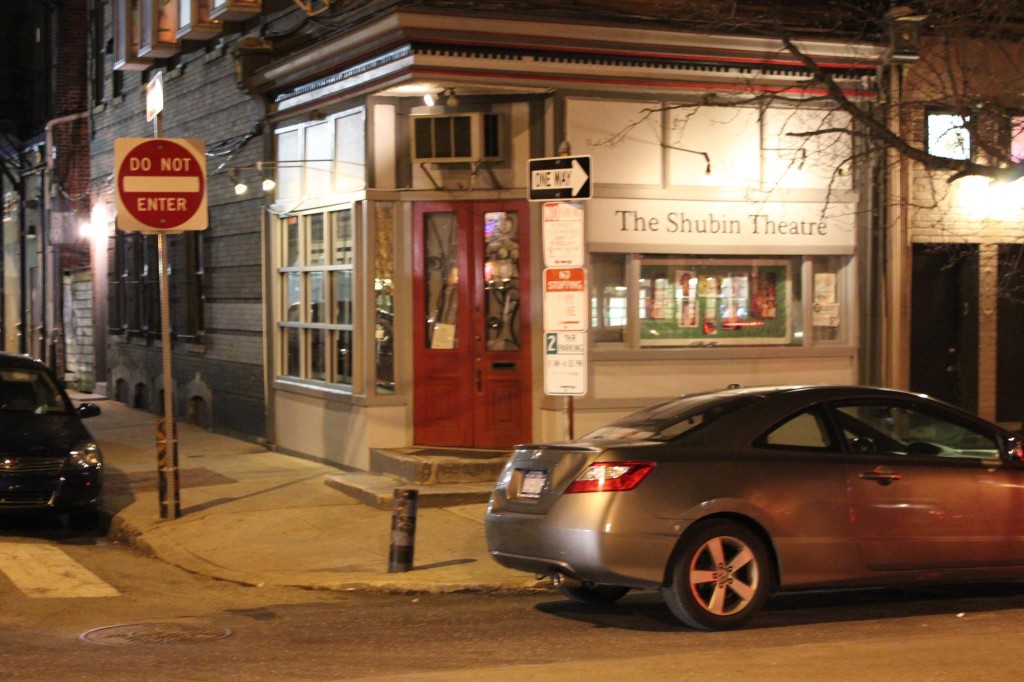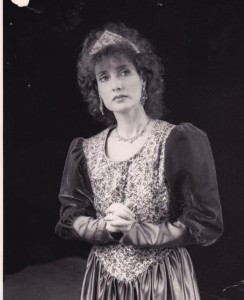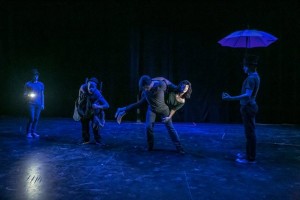 So the Shubin Theatre is closing. When I heard the news, it brought me back to the first time I ever encountered Denise Shubin and the little theater on Bainbridge Street she’s run for almost three decades.
So the Shubin Theatre is closing. When I heard the news, it brought me back to the first time I ever encountered Denise Shubin and the little theater on Bainbridge Street she’s run for almost three decades.

There I was, fairly new to the city, artistic director of newly-formed Quince Productions and about to direct my first show in Philadelphia. I can’t remember how I first heard about the Shubin, but I set up an appointment to see it. When I arrived, I encountered this woman with wild black hair, a manner that somehow combined mellow with wacky, a background that matched mine almost exactly, and even a name that echoed mine. We talked about Jewish upbringings (we both had one), the east and west coasts (we’d both lived on both), the challenges faced by someone in the theater world as they become a little more…mature (we both knew that feeling). Can you say “instant simpatico?” While I rejected Denise’s idea of calling the production “Rubin at the Shubin” (I’m pretty sure she was just joking), I signed on immediately for a four-week run.
It was the first of seven or eight shows we produced there. The first GayFest! was held at the Shubin, and some of the shows I’m proudest of were performed on that tiny stage. Now that Denise has announced the theater is soon to be retired, my first thought is, “How dare she? She actually wants a living room?” But even as I type that, I realize that’s the very quality that made the Shubin so appealing: it was like seeing a play in someone’s living room, not only because of its small size but because of the homey atmosphere. A “normal” theater has a big lobby, a concessions stand, large banks of equipment, and a bunch of rest rooms. The Shubin has a lobby that’s…well, I’d say “postage stamp size,” but stamps have gotten bigger these days. One restroom, about three point two lighting instruments, a basement dressing room, a stage as big as your average box office, and a somewhat size-challenged audience area that you enter from the front row (latecomers, beware).

So what is it that’s drawn me—and thousands of other people—to use this little shoebox? Well, the cheap rent was an obvious factor. There just aren’t a lot of theater spaces you can rent for under $1000 a month (and the Shubin was always WAY under that). More importantly, though, it’s an attitude, a feeling, that comes from Denise Shubin herself. She’s a performer, so she knows what it feels like. She’s impatient with paperwork and bureaucracy, so she basically just doesn’t put you through it. When you rent (it’s hard to use the past tense with the Shubin), the space is yours. There’s no “you can have it between 10 am and 9 pm” or “you can’t paint the floor” or “no nails can go here” or “I need 300 forms and certificates before you can move in.” It’s yours. (I certainly understand why theaters have to place these limits, and I don’t begrudge them, but Denise’s easygoing spirit—the by-product of keeping the operation small—has always been appealing.) The only restrictions on things like set construction were self-imposed: since Denise and her husband Don live upstairs, you didn’t want to be disturbing them with late night hammering and drilling. It was a matter of consideration, not contracting.
Such things go both ways. Says Katherine Filer, founder and artistic director of Actors International Theater, a company committed to opportunities for the physically and vocally disabled: “Every, and I mean everything I asked of her, she said `yes.’” As a first-timer (AIT’s debut production was performed at the Shubin in the 2014 Fringe), Filer describes a feeling familiar to those who have worked in the space: “I thought to myself, this is perfect for what we are creating with this show. I loved the intimacy, charm and authenticity of Denise from the first moment I met her. I really felt this theater had the same beautiful qualities of its owner.” Most importantly, perhaps, as a new company (many who produce at the Shubin are), Filer experienced one overriding emotion: “This being our first time, I just felt like everything would be okay.”
 The Shubin gave you an artistic freedom you just don’t have at other places. I remember marveling at how the place was so utterly transformed for Magic Circle Theater’s production of Elizabeth, with a floor treatment that turned the black stage into a parquet wonder, and hot pink walls that made the place look a hundred times bigger. That just wouldn’t have been possible in most theaters—at least, most theaters a small company could afford. Later, Josh Hitchens, the director of that show, proudly showed me the little red spots on the ceiling that were a quasi-permanent reminder of his production of Macbeth.
The Shubin gave you an artistic freedom you just don’t have at other places. I remember marveling at how the place was so utterly transformed for Magic Circle Theater’s production of Elizabeth, with a floor treatment that turned the black stage into a parquet wonder, and hot pink walls that made the place look a hundred times bigger. That just wouldn’t have been possible in most theaters—at least, most theaters a small company could afford. Later, Josh Hitchens, the director of that show, proudly showed me the little red spots on the ceiling that were a quasi-permanent reminder of his production of Macbeth.
In other words, he’d not only accomplished a major transformation but in a small way left his mark. What could be more fitting for a place like the Shubin? After all, this is a theater owner (there’s that present tense thing again) who has always cared more about providing a service than cashing in. When we produced there in the summer, I often asked myself, “After they pay the a/c bills, how do they make any money?” (The air conditioner, by the way, was donated by someone who’d used the space; typically, Denise’s goodness made people want to reciprocate.) The Shubin has always functioned as a kind of “talent incubator.” I can’t think of many people in Philadelphia’s theater scene who haven’t worked there. Most eventually “graduate” to larger, more expensive spaces. We did, and sometimes I still wonder why.
There was an attentiveness, a CARING, that could only come from someone who was running the joint as her own “baby.” Heat didn’t come on during a chilly April? Denise or Don was down within minutes (admission: Don is much better at fixing things). Wanted to make sure your opening night was full? Denise was there—and always insisted on paying for her ticket. I’ve always said “the pretty good friends show up when you need them, the really good friends show up and PAY.” Is there any doubt which category Denise Shubin belongs in?
In the end, what Denise has proven is that you CAN run a place on a wing and a prayer. As director Dave Ebersole—veteran of almost a dozen productions at the Shubin—remarks: “I’ll never forget when I first heard Denise Shubin say she had created the Shubin as a small space to make people’s dreams happen. Every time I’ve done a play there, some small dream of mine has indeed happened. I think that’s the best legacy the Shubin and Denise have left the Philadelphia theater community. She made people’s dreams happen.”
Or, as Katherine Filer says: “I feel honored and grateful that we had the opportunity to perform in such a loving, intimate and joyful theater. Now I am wondering where we will be next year.”
She’s not alone in either of those thoughts.
—
What are your memories of the Shubin? Share them below.

In 1997, I visited this little theater one block below South St. in Philly to see a friend read her poetry. A quaint, intimate, black box, the next day I immediately called to rent the space. When I spoke with the owner, Denise Shubin and told her of my one woman show, “Doin’ Dunbar as ‘Lias’ Mother” and the theme of plantation days…she asked “what about the white woman?”
We met, and found we were kindred “sisters” who bonded over the concept and conceived “The Other Side of Gone Wid Da Wind”…I mailed her a pink southern belle prom dress I found in a thrift shop, the movie “Mandingo” on VHS…books: Incidents in the Life Of A Slave Girl by Harriet A. Jacobs, Within The Plantation Household – (Black and White Woman of the Old South) by Fox-Genovese, the letters of Susan B. Anthony and a book on Paul Laurence Dunbar’s poetry.
Denise became “Miss Lucy” from Dunbar’s “When Malindy Sings” and I became her “Nellie”.
Denise wrote and powerfully delivered a mesmerizing, compelling, heart wrenching monologue of a white woman also “enslaved” by the trappings of society in the 1800’s. As “THE MISTRESS SPEAKS”…she found the pleasantries of being the lady of the house, soon crumbled, by the infidelities and sexual escapades in her husband’s twisted world. As ‘Lias’ Mother, I open with my friends young son from Coatesville, Ira Hunter who played my son, Elias. Nellie, (‘Lias’ Mother) is physically enslaved, but spiritually and mentally, she is free. What life she is born into, under bondage, of the peculiar institution, she lives with dignity, grace, pride and love of family and friends.
With no rehearsal, hand out, home made flyers, both of us working other gigs…Denise performing in a play at her theater and I doing Dunbar workshops with two schools…then both our big mouths for pr…our opening night was our rehearsal. A lone couple from New Jersey, filled the house with moans, groans, umh, oh, yes, and gentle laughter. The following runs were full audiences thanks to Chris Ridenhour who brought us into his TV show for an interview. Word got out. 2 week ends in 1998 between Black History/Woman’s History Month….we were a hot topic long before the HBO Slave Narratives.
Off the stage, our families and friends bonded and ended the first run over a huge pot of my homemade gumbo. Denise became my mother’s “adopted” daughter, my sisters, sister..adding more roots to her already over grown artistic family tree. Don & Denise’s home above the theater is an eclectic avante garde’ art gallery/curio filled treasures of memorabilia and Don’s fabulous original art works. We hooked up the play again in 1999 and in 2001 to a full house and wonderful…way, way off Broadway reviews.
When Denise and I were interviewed by Chris, I never forgotten her voice…”The stage is a sacred place!” To this day, I keep her words in my heart, mind and soul, every time I step on any stage, from backyard to auditoriums.
Its 2014 and I was dreaming of “The Other Side Of Gone Wid De Wind” for 2015. But I guess it will happen on the road that I travel and maybe without “The Mistress Speaks”.
The Shubin Theater is closing, if its cool with her, its cool with me. I’m still on the road, Doin’ Dunbar as ‘Lias’ Mother. So to Denise Shubin, I send out a shout of love and gratitude for being, creating and performing with such a lovely human and gifted lady. Thanks Denise, for being a true Renaissance renegade! Wild Woman of the Art Universe, Gypsy Flamingo Dancer, etc. etc. etc….but most of all for being one of my most treasured Soul Sisters ever! Anytime ya want to do it again…let me know…I’m ready when you are Miss Lucy. XOXO
My memories of the Shubin Theater were not so much the bricks, but the generous kindness and support given to a stranger in a strange land by Denise and her family as I trod the running paths of Philly and the gauntlet that was medical school.
Saw my share of good stuff there over the years. I did tend to refer to the venue as the Shoebox, but lovingly so. Thank you, Denise and Don, for your kindness and generosity. Best Wishes, Eileen O’Brien
Without Denise and her direction and generous use of her theater for auditions and rehearsals the radio series I produced would have never gotten off the ground. She’s a class act all the way.
I meant without -a bit of mental confusion caused by my sadness.